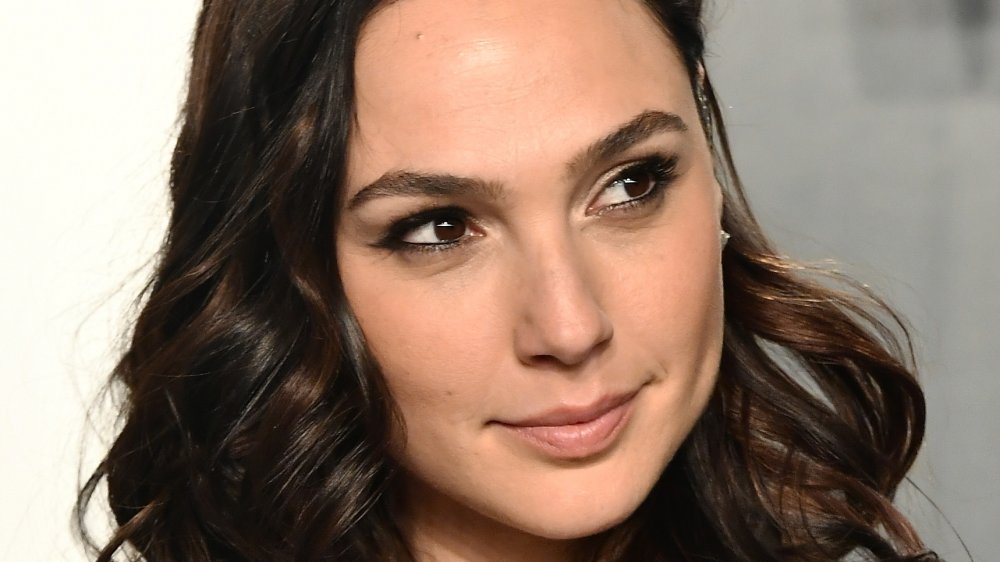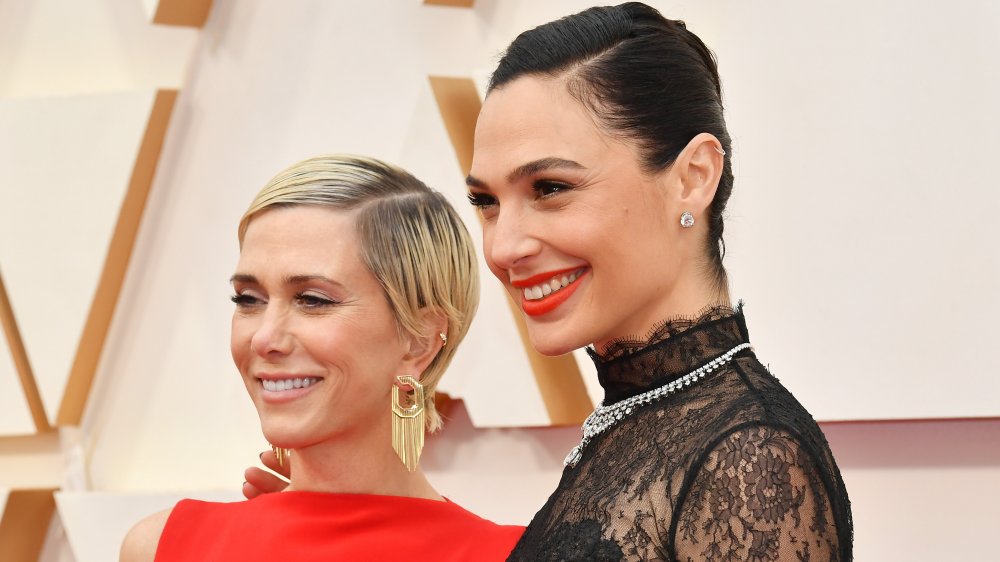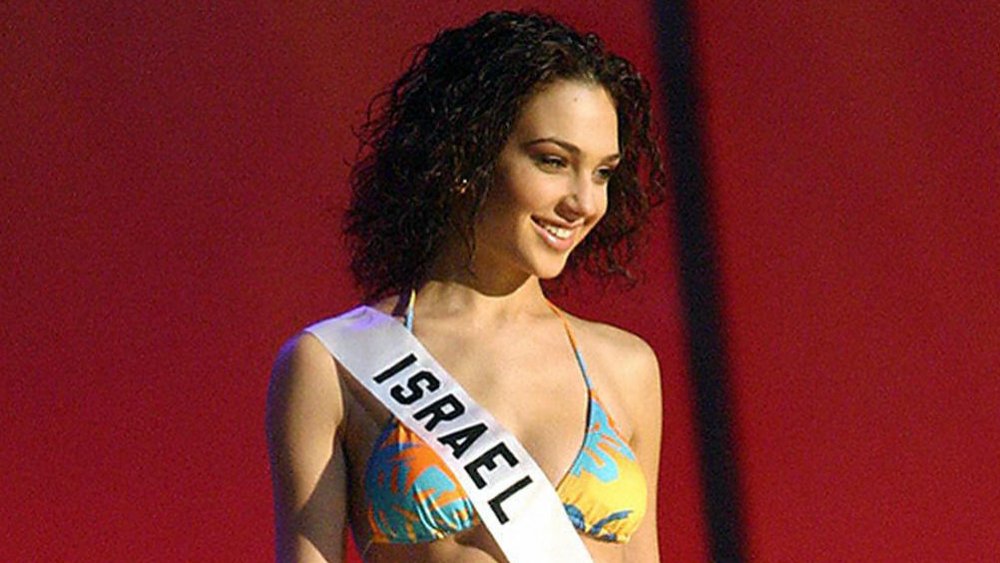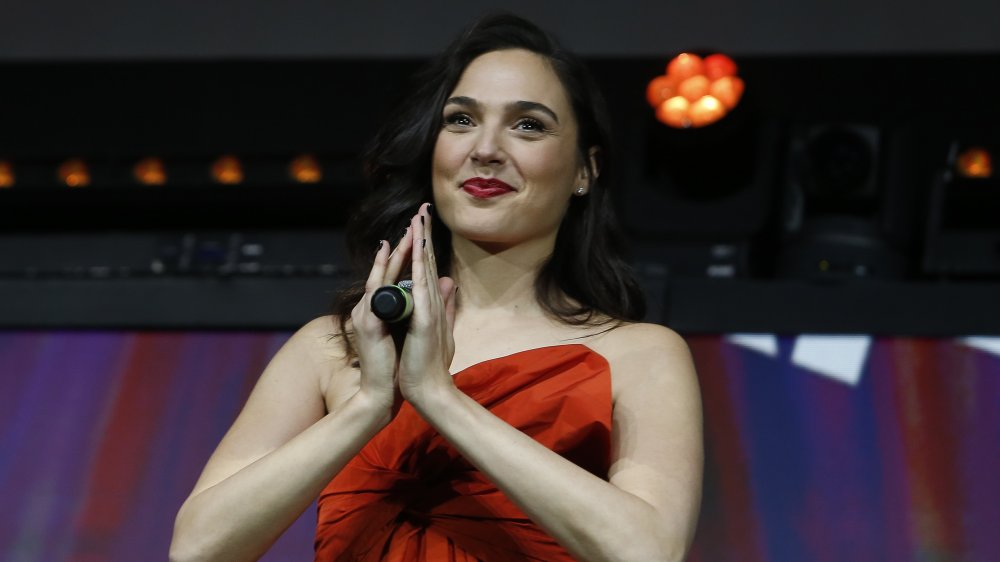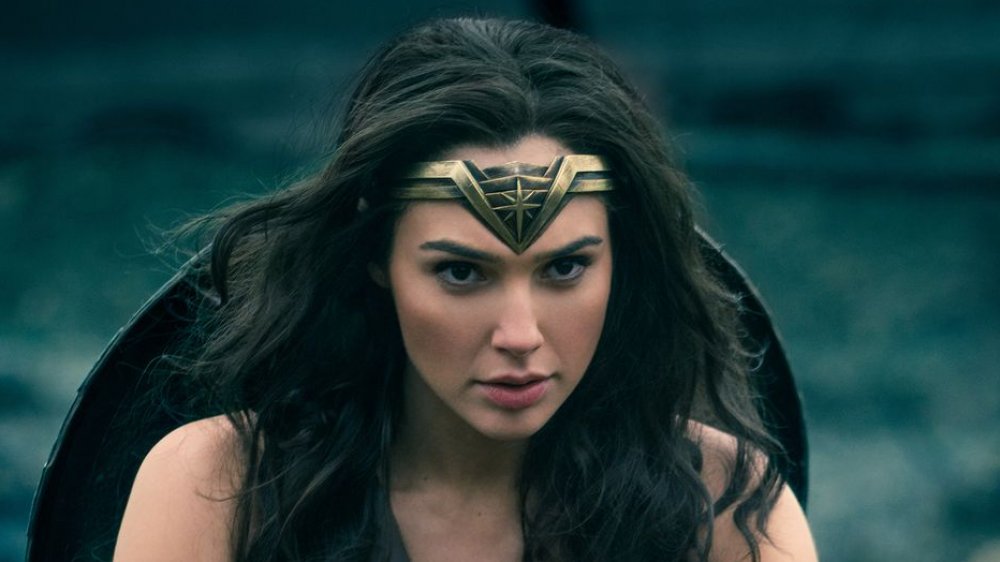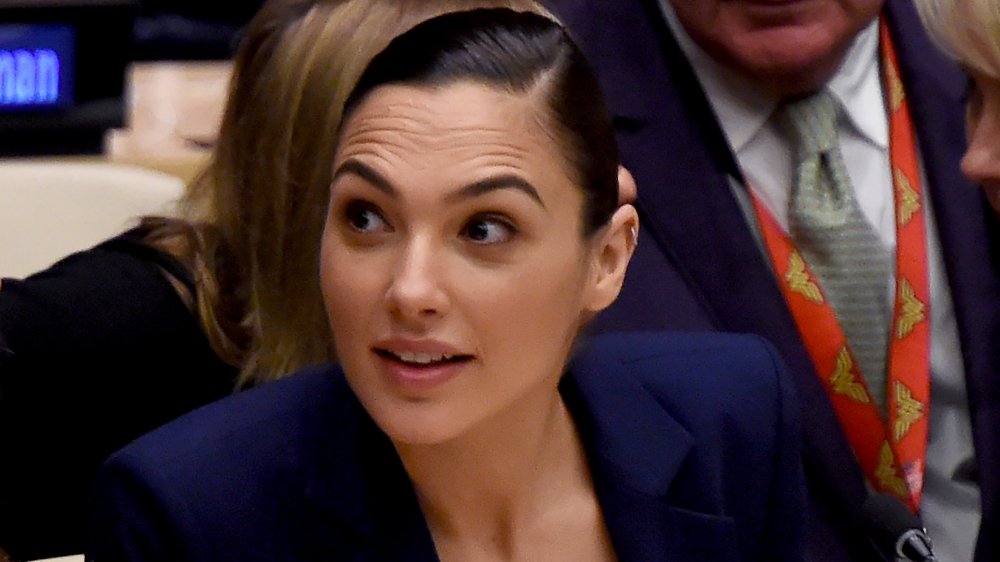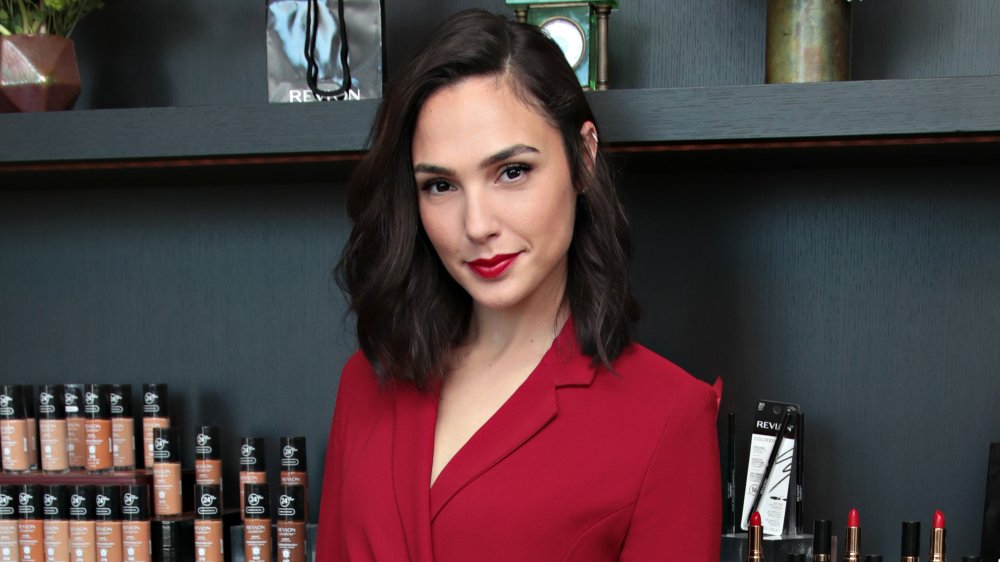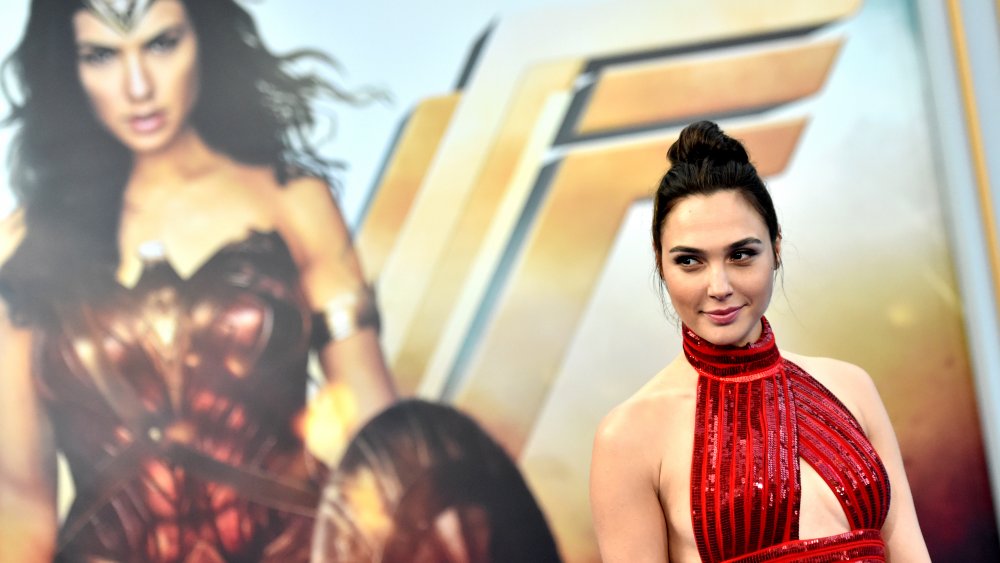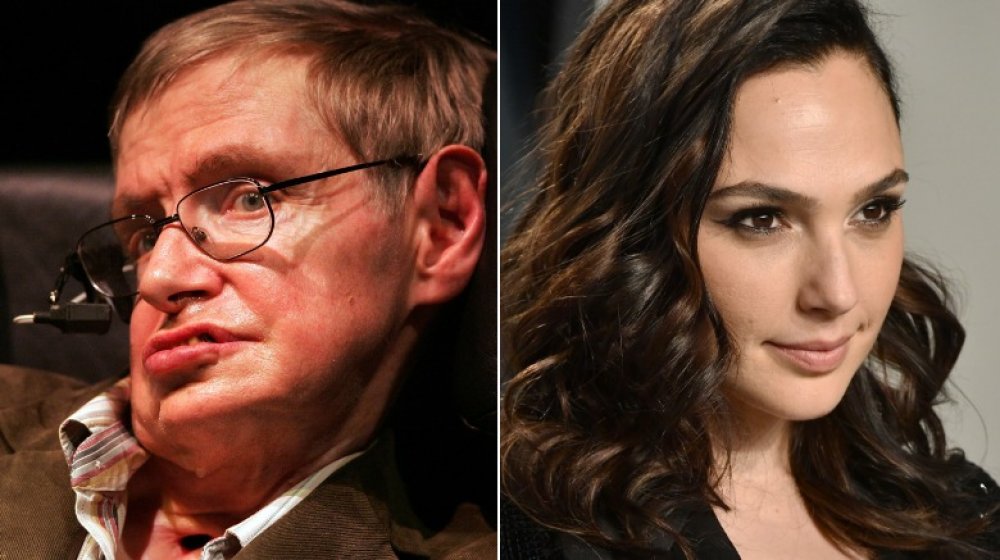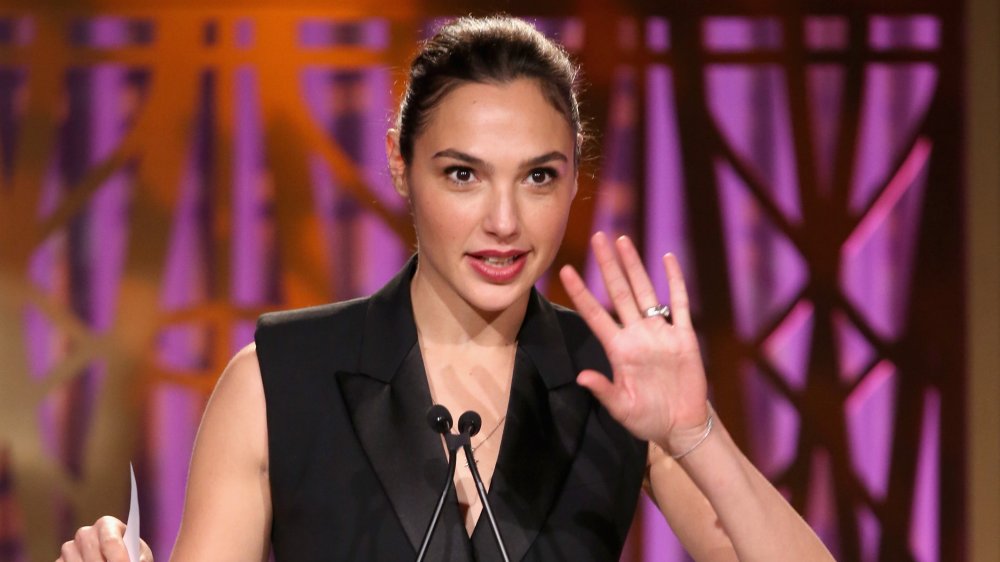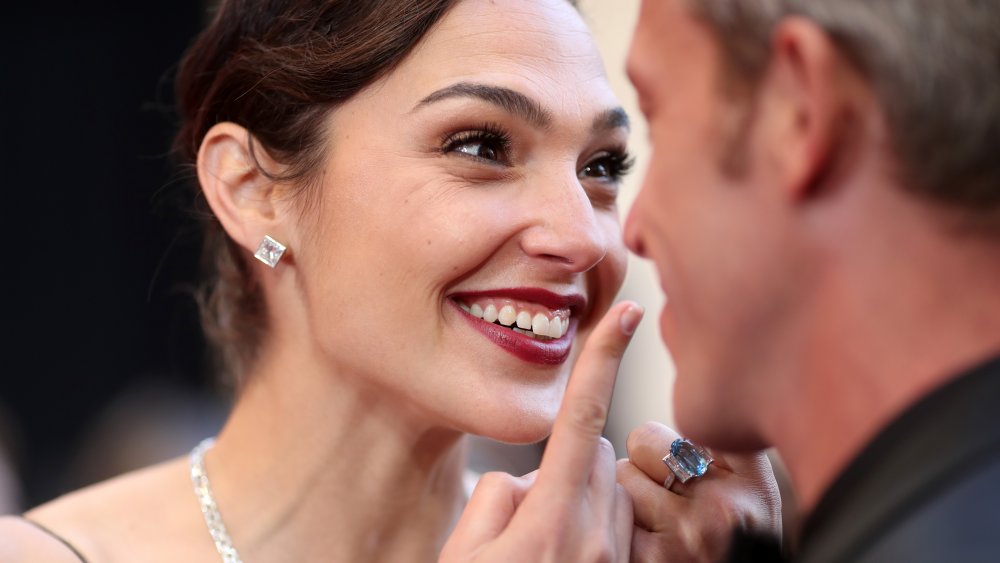Gal Gadot's Most Controversial Moments
Gal Gadot might be the face of a hugely popular Hollywood franchise, but not everybody sees her as a superhero. The Wonder Woman actress began on her path to stardom in 2004 when she was crowned Miss Israel, kick-starting the then-18-year-old's career as a model. She joined the Israel Defense Forces after that, completing two years of mandatory service as a trainer (she was given the role "after excelling in a grueling three-month boot camp," Glamour reports). After leaving the military, Gadot studied law, but her life would take another new direction when a casting director approached her about becoming the next Bond girl.
After some convincing, Gadot auditioned for the part of Camille in 2008's Quantum of Solace. She didn't make the cut, but the same casting director quickly wrangled her a part in another big franchise. The Israeli actress made her Hollywood debut in 2009's Fast & Furious, playing former Mossad agent Gisele Yashar (Gadot later told Forward that director Justin Lin "really liked that I was in the Israeli military"). Before long, the new girl in town was on Warner Bros.' radar. Gadot was asked to audition for Wonder Woman, and the rest is history. Her rise to the top hasn't been without the odd controversy, however.
She hasn't shied away from sharing her opinion since finding fame, and that hasn't always ended well for her. Let's take a look back at the times Gal Gadot was more Blunder Woman than Wonder Woman.
Gal Gadot's coronavirus morale booster backfired massively
In March 2020, Gal Gadot went into self-quarantine as the U.S. and the rest of the world ramped up efforts to contain the spread of coronavirus. On her sixth day in isolation, the actress released a little morale booster for everyone practicing social distancing amid the global pandemic. "You know this virus has affected the entire world, everyone," she said in the now-infamous Instagram video. "It doesn't matter who you are, where you're from. We're all in this together." Explaining that she was inspired by a video of an Italian trumpeter playing John Lennon's classic "Imagine" from his balcony, Gadot decided to enlist a bunch of A-list pals for her own version of the song. The video went viral for all the wrong reasons.
With cameos from Kristen Wiig, Jimmy Fallon, Amy Adams, Zoe Kravitz, Will Ferrell, and more, the general opinion online was that the video was way out of touch and more than a little cringe. People were quick to point out that donating to those struggling with isolation would be a lot more helpful than singing to them. "No politician can unify people in the way that the 'Imagine' video seems to have united every single person against it," comedy writer-producer Josh Gondelman joked in a tweet that quickly gained over 50,000 likes. Some celebs even joined in — actor Billy Eichner, for one, was "torn between being mortified by the 'Imagine' video and furious I wasn't asked."
Gal Gadot's Maxim photoshoot was deemed 'pornographic' in Israel
Gal Gadot actually managed to make the front page of an American tabloid a few years before she was cast in her first Hollywood movie. Back in 2007, the former Miss Israel and a number of other female members of the Israeli military posed in bikinis for a campaign organized by the country's Minister of Tourism. The shoot (done in cooperation with Maxim, which described Gadot as "flawless" and dubbed the women of the Israeli Defense Forces "the world's sexiest soldiers") was supposed to entice new visitors, but it ended up bringing unwanted attention to Israel.
Several women politicians spoke out against the raunchy images. UK Labour Party member Colette Avital called the Maxim spread a "pornographic campaign to encourage tourism" in a scathing statement, but the media outlet insisted that it was "pleased with the result" of its collaboration with the Israeli consulate (via The Guardian).
When Gadot spoke with Forward a few years later, the actress admitted that the Maxim shoot caused major controversy at home and revealed that it quickly got out of hand overseas, too. "Some of the women in the Knesset didn't like the idea of using girls in that context," Gadot recalled. "The next thing I know, I was giving out interviews on Fox 5 and was on the cover of the New York Post."
Gal Gadot's support of Israeli troops in Gaza sparked online fury
Gal Gadot's time in (and open support of) the Israel Defense Forces has been the root of multiple controversies throughout her career. The actress caused waves in 2014 when she seemed to give her backing to Israel's invasion of the Hamas-ruled Gaza Strip, the site of much bloodshed over the years. "I am sending my love and prayers to my fellow Israeli citizens," she posted to Facebook that July, just weeks after the Israeli army launched Operation Protective Edge. "Especially to all the boys and girls who are risking their lives protecting my country against the horrific acts conducted by Hamas, who are hiding like cowards behind women and children. We shall overcome! Shabbat Shalom!"
The actress posted the same photo (a snap of her praying alongside her daughter) and message to Instagram, where it was met with a mixed reaction. While some praised Gadot for showing support for her home country, many others expressed anger at her pro-IDF stance. "Palestinians are facing ethnic cleansing ever since the Zionist Israelis started snatching land," one user fired back at Gadot as the post's comments section. "What would you do if your land, home, and everything you had [was] being taken away constantly?" According to The Independent, up to 500,000 people were displaced during the 50-day war of 2014.
Why the Middle East rejected Gal Gadot's Wonder Woman
In 2017, Gal Gadot's first solo outing as Diana Prince was a roaring success for Warner Bros. and DC. Wonder Woman pulled in over $821 million at the worldwide box office and was ultimately Certified Fresh on Rotten Tomatoes with an impressive 93 percent score. It was a global smash — well, almost.
Wonder Woman encountered problems in parts of the Arab World, where governments rallied against it in protest of its ex-military star. Gadot had been very open in her support of the Israeli military in 2014, and opposing countries in that part of the world weren't willing to ignore this fact. Lebanon got the ball rolling, banning the film outright. Before long, neighboring nations were following suit. "The organizers of the Nuits du Cinéma film festival in Algiers prohibited it from screening," Forbes confirmed. "Later, Jordan banned the movie, and Tunisia blocked its release ... The Times of Israel reported that one theater in Amman apologized to its patrons for screening the film."
What did Gadot have to say about all this? We'll never know. The actress was asked what she thought about Wonder Woman being banned in Lebanon during an interview with Israel's Channel 2, and she answered. According to The Times of Israel, studio execs pounced on the footage and demanded that any reference to the ban be deleted. In "protest," the TV station refused to play any of the interview. In trying to avoid one controversy, producers created another.
Gal Gadot lashed out at the U.N. over an ambassador snub
In 2016, the United Nations named Wonder Woman an honorary ambassador for the empowerment of women and girls — but her tenure got off to a rocky start. According to The Guardian, the event that was arranged to mark the occasion was marred by "a silent protest by audience members who turned their backs on the panel, which included current and former Wonder Woman actors Gal Gadot and Lynda Carter." It quickly became apparent that many within the organization thought that a fictional, scantily-clad woman wasn't the right fit for this particular role. Hundreds of outraged U.N. staff members signed a petition, and it worked — Wonder Woman was stripped of her ambassadorship.
Gadot didn't respond to the controversy right away, but when she did, she didn't hold back. Speaking to Time, the Israeli A-lister claimed that the whole thing was totally unfair. "There are so many horrible things that are going on in the world, and this is what you're protesting, seriously?" the actress told the magazine. "When people argue that Wonder Woman should 'cover up,' I don't quite get it. They say, 'If she's smart and strong, she can't also be sexy.' That's not fair. Why can't she be all of the above?"
Gadot has, in fact, defended her movie costume on numerous occasions. "I think as a feminist, you should be able to wear whatever you like," she later told The New York Times.
Gal Gadot's Revlon ambassador deal led to controversy
Gal Gadot revealed that she had "joined the Revlon family" as a brand ambassador for the 2018 Live Boldly campaign. "It's going to be beautiful," she promised her Instagram followers, but things actually got pretty ugly. The actress became embroiled in controversy once again when popular blogger and social media star Amani Al-Khatahtbeh (a.k.a MuslimGirl) rejected a Revlon Award because Gadot was the face of the brand. In a statement posted to Instagram, Al-Khatahtbeh explained that Gadot's support of the Israeli military was the main reason.
"As much as this means to me and I would love to be there to celebrate with you, I cannot accept this award from Revlon with Gal Gadot as the ambassador," Al-Khatahtbeh wrote. "Her vocal support of the Israeli Defense Forces' actions in Palestine goes against MuslimGirl.com's morals and values." She went on to note that she couldn't accept the award "in good conscience," because she knew of a 16-year-old activist named Ahed Tamimi who had been imprisoned by the IDF.
Al-Khatahtbeh later added a post to MuslimGirl, going into more detail about the imprisoned girl and why she rejected Revlon's Changemaker Award. Speaking directly to Gadot, she wrote: "This is about the moral obligation of privileged women like ourselves to rise to the moment of demanding freedom for Ahed and that of countless other girls like her." The Jerusalem Post attempted to reach Gadot for comment, but she failed to respond before press time.
Gal Gadot clashed with comic book fans over body shaming
When staff at the United Nations rallied against Wonder Woman being named an honorary ambassador, the petition they signed referred to the DC character as a woman of "impossible proportions," a description that doesn't exactly fit Gal Gadot. When she was cast as the Amazonian back in 2013, the Israeli actress faced backlash from some fans of the source material, who suggested that she wasn't right for the role because she didn't have the correct body type.
Gadot played the backlash for laughs on a "Mean Tweets" segment of Jimmy Kimmel Live!, but the complaints persisted. It became a news story in her home country, where people started to question Gadot's health. "They said that I was too skinny and my boobs were too small," she told Israeli outlet YNetNews (via ScreenRant). "After, they asked me here, in Israel, if I have eating disorders and why am I so skinny. They said my head was too big and my body was like a broomstick."
That kind of body shaming can go a long way to killing a person's confidence, but Gadot refused to let the haters get her down. Instead, she played them at their own game, inviting them to look up the Amazonians for themselves. "I told them, 'Listen, if you want to be for real, then the Amazons, they had only one boob," she told Rolling Stone in 2017, the year Wonder Woman's box office performance emphatically silenced the doubters.
Gal Gadot made an ableist remark about Stephen Hawking
Gal Gadot likes to speak out when there's something terrible going on in the world, but the world doesn't always thank her for it. Long before she masterminded an ill-fated celebrity cover of "Imagine" that united isolated COVID-19 patients in anger, Gadot drew the wrath of the internet when she posted a controversial tribute to the late Dr. Stephen Hawking. The brilliant cosmologist and theoretical physicist, who was diagnosed with amyotrophic lateral sclerosis (ALS) when he was 21, passed away in 2018 at the age of 76. Like many celebrities, Gadot took to Twitter to honor him.
"Rest in peace Dr. Hawking," the Wonder Woman star tweeted. "Now you're free of any physical constraints. Your brilliance and wisdom will be cherished forever." There's no doubting that Gadot's heart was in the right place, but she put her foot in her mouth big time with her wording. Suggesting that Hawking lived with "physical constraints" was seen as ableist by a number of her followers, some of whom called her out.
"I think you're fantastic Gal but this tweet is very ableist," disability advocate Adam B. Zimmerman replied. "His physical constraints didn't stop him from changing the world. People with disabilities don't wish for death to be free of their challenges. We wish to be valued for what we CAN do, not pitied for we can't." Zimmerman's response was retweeted hundreds of times and liked by thousands of people.
Gal Gadot's beef with the Israeli government explained
As one of Israel's biggest ever exports, Gal Gadot's success in the States has been a source of pride for citizens of the country — but in recent years, her popularity among politicians at home has waned somewhat. In 2019, the movie star threw her considerable weight behind actress and reality TV host Rotem Sela, a friend of hers who was feuding with the Israeli government over Arab minority rights.
According to BBC News, Sela spoke out after Israel's Culture Minister warned protest voters not to accidentally elect Arab MPs. "When the hell will someone in this government convey to the public that Israel is a state of all its citizens and that all people were created equal, and that even the Arabs and the Druze and the LGBTs and — shock — the leftists are human," Sela said on her Instagram Stories. Before long, Benjamin Netanyahu had replied with his own Instagram post. "Dear Rotem," the Israeli Prime Minster wrote. "Israel is not a state of all its citizens ... Israel is the nation-state of the Jewish people — and only it."
Despite the fact that she's backed (and taken part in) Israeli government military campaigns in the past, Gadot wouldn't side with them this time. "This isn't a matter of right or left, Jew or Arab, secular or religious," she wrote, urging everyone to start a "dialogue for peace and equality and of our tolerance of one towards the other."
Gal Gadot is adapting a controversial Hebrew book for the big screen
If she can't convince people to "love thy neighbor" with social media posts, then perhaps Gal Gadot can achieve that with a film. In December 2019, it was revealed that Gadot and husband Jaron Varsano were co-producing a big screen adaptation of controversial Hebrew novel Borderlife.
Written by Israeli author Dorit Rabinyan, the 2014 book caused waves in the author's home country, because it revolves around a romance between a Jewish woman and a Palestinian man. Borderlife (published as All the Rivers in English) was banned from school reading lists in Israel, a decision that was met with student protests. The novel was later given the okay for advanced literature students, but Gadot is still likely to run into problems when she tries to get the movie version onto Israeli movie screens.
That isn't stopping her from plowing ahead with the project, however. According to Deadline, the Wonder Woman 1984 star and her hubby have arranged a partnership with American studio Keshet International through their newly former production company, Pilot Wave. "We bring the perspectives and experiences of unique people, to guide new themes in society with stories that inspire and ignite the imagination," the company's official website states. "Brought to you by Gal Gadot and Jaron Varsano, Pilot Wave production company believes in cinematic creativity for growing a new sense of belief in the drama." The company's first feature will definitely bring the drama, that's for sure.

